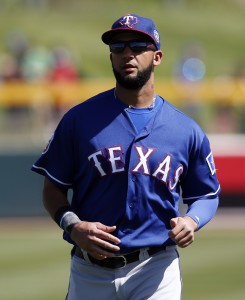Some news as we head into Tuesday…
- There isn’t much new to report on the extension talks between the Cubs and Theo Epstein, as the president of baseball operations told reporters (including Bruce Levine of 670thescore.com) that the two sides “haven’t talked a lot about” a new deal. “The talks we have had [were] very amicable, productive, moving in the right direction,” Epstein said. Epstein’s original five-year, $18.5MM deal is up after this season, though the lack of urgency in talks may reflect the seemingly small chance that he leaves Wrigleyville. Both Epstein and Cubs management have both expressed a desire to continue their relationship, plus one has to think it would be unusual for Epstein leave just as the team is starting to enjoy the fruits of its rebuild.
- Nomar Mazara’s big debut for the Rangers is already drawing a lot of attention, though as Baseball America’s Ben Badler recaps, many opposing scouts were stunned by the $4.95MM bonus Mazara signed in 2011, which is still a record for a 16-year-old international player. Scouts at the time questioned Mazara’s ability to consistently make contact, and also the decision by Mazara’s trainer to keep him out of playing in actual games. His evolution into a top-rated prospect and (through two games, at least) a promising big-leaguer, however, has made the Rangers’ investment look very solid.
- In another Mazara piece, Evan Grant of the Dallas Morning News hears from rivals scouts who explain why Mazara is a more polished hitter than another well-regarded Rangers prospect, Joey Gallo.
- The Red Sox didn’t use Pablo Sandoval to pinch-hit against righty reliever Mychal Givens today, leading ESPN Boston’s Scott Lauber to wonder if the Panda really has any place on the Sox roster if the club isn’t willing to use him even in seemingly tailor-made pinch-hitting situations. Sandoval only appeared in three games and received seven plate appearances so far this season, after losing his starting third base job to Travis Shaw in Spring Training.

